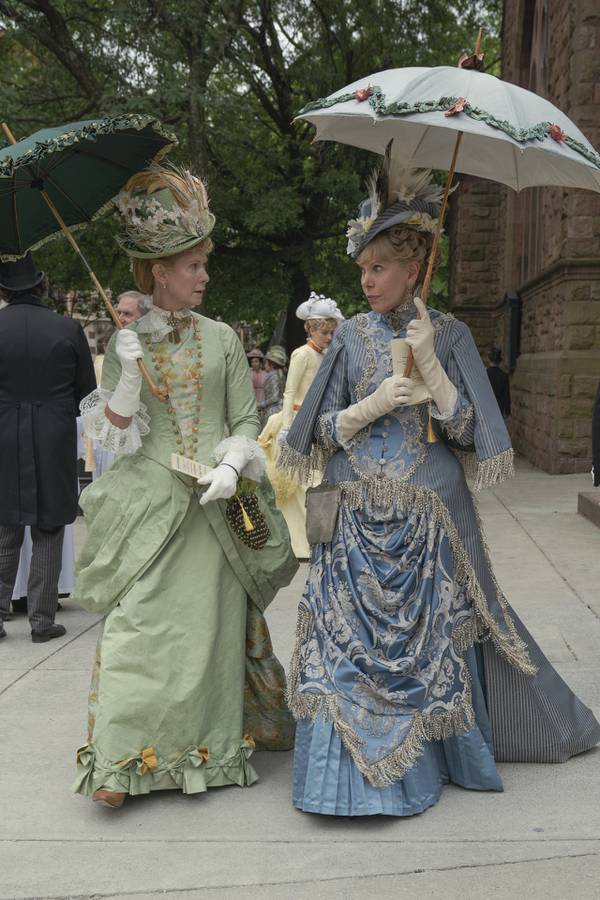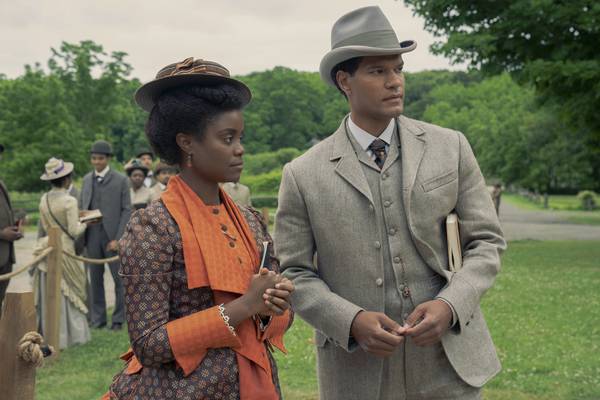[ad_1]
The setting of HBO’s “The Gilded Age” is 1880s New York, nearly half a century before zippers began appearing on clothing. And yet there they are, running up the backs of women’s dresses in Season 2, showing that the show’s budget doesn’t match the illusion it desperately hopes to sell.
You know it’s bad when a series preoccupied with opulence can’t even nail the costumes.
Let’s look at it from another angle. Last week in the New York Times reported about parking lots where full-time workers live out of their cars because they earn too little to pay the rent but too much to qualify for government assistance. This is not an event that just happens, it is something planned by those in power. “If one man has five houses, and another man is starving, the first man has one thing, and the second man has something.” It’s a thought attributed to late 19th-century activist Mary Elizabeth Lease, who would probably have some thoughts about how things were going 150 years later.
Lest anyone forget, back in July, when television and film writers were on strike, an anonymous studio executive described the company’s demise this way: Let things continue “until union members start losing their apartments and houses.”
Meanwhile, Hollywood continues to publish more stories about the rich.
Julian Fellowes comes first among the criminals. This series, a sequel to the HBO series “Downton Abbey,” uses the title as an endorsement rather than originally criticizing Mark Twain. intended: A metaphorical “you’ve got to be kidding me” about the era’s veneer of elegance and class that can never hide the taint of robber baron corruption underneath.
Have you noticed that despite the increase in union organizing and strikes, none of them are on our screens? Well, “The Gilded Age” tries to fix that by adding some business headaches for the railroad magnate played by Morgan Spector. It was used so clumsily that I wish they hadn’t bothered with it. But there comes a point when a group of industrialists gather around a boardroom table to rail about demands for workplace safety and fair wages, and if you squint, you might wonder what it looks and sounds like when studio heads have been doing this for the past few months. We met privately to discuss the Hollywood strikes.

Carrie Coon, an actor too talented for the ill-fated scenario of “The Gilded Age,” was faced with the thankless task of playing Spector’s wife. His primary concern this season is an “opera war”, which sounds more interesting than it is, but this seems to be a story loosely based on the story of Alva Vanderbilt, who despite all the odds manages to successfully enter high society and subsequently support it. Establishment of a new, rival opera house in New York. It represents new money. It stars Christine Baranski as the arrogant widow from across the street who adheres to old money norms. Christine Baranski sees her tightly controlled existence thrown into turmoil when her sister Cynthia Nixon has a spinster romance and also the family fortune is at risk. He goes up in smoke because of his son’s arrogance. If one thing is true in the show, it’s that wealth does not make you smart.
Maybe the show wouldn’t have left me so grumpy if it hadn’t been so boring and overly emphatic, with its trembling strings and heralding horns. It’s all about desire, the absence of interiority or human complexity. Say what you will about “succession” (and I said it too plenty ofonly some of it is free) but at least he understood how to convey caustic humor and drama.
Edith Wharton was the best writer of her time to capture the excesses of the Gilded Age. Nor did she write about holding power to account. So why do Fellowes’ efforts feel so hollow when Wharton’s books are so rich by comparison? Maybe because he’s an insider writing about a world he understands. I went back and read some of his works, including “Customs of the Country” and it’s not about the mannered dialogue, it’s the characterizations in between that serve as a kind of commentary detailing how his characters react from one moment to the next. the next, or simply transporting themselves around the world. This isn’t in the HBO series, and that’s even flatter for it.

One of the series’ major narratives is the story of the journalist/personal secretary played by Denée Benton, providing a window into the lives of the Black middle class during this period. It’s notable that her character shoulders the burden of social problems, while everyone else gets caught up in the absurdity of courtship and who gets invited where. Here’s an idea: Greenlight a series about the real-life Ida B. Wells instead.
Meanwhile, PBS is also airing a two-hour 2018 “American Experience” episode titled “The Gilded Age.” Streaming for free on American Experience Youtube channel also its Web site and serves as a living antidote to the “rich people are great” propaganda that Fellowes doesn’t want to part with.
“We cannot step back, or we will lose everything we have worked to build throughout our lives!” says one of the rich so-and-so in the HBO series. It’s a shame they couldn’t have put on a better show.
History is more interesting than that. People They’re more interesting than that.
“The Gilded Age” Season 2 – 1.5 stars (out of 4)
Where to watch: Sundays at 8pm on HBO (and streaming on Max)
Nina Metz is a Tribune critic.
nmetz@chicagotribune.com
 Best American Comics News bestamericancomics.com started its broadcasting life on December 21, 2022 and aims to offer original content to users. Aiming to share information in technology, science, education and other fields, bestamericancomics.com aims to provide its readers with the most up-to-date and comprehensive. Since the content of the site is created by expert writers, readers are reliable and accurate referrers.
Best American Comics News bestamericancomics.com started its broadcasting life on December 21, 2022 and aims to offer original content to users. Aiming to share information in technology, science, education and other fields, bestamericancomics.com aims to provide its readers with the most up-to-date and comprehensive. Since the content of the site is created by expert writers, readers are reliable and accurate referrers.


